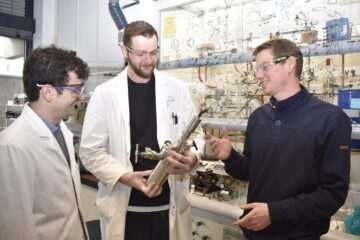Fantastic voyage into the heart delivers a protector against heart failure

Reminiscent of the 1966 sci-fi thriller Fantastic Voyage, where a surgical team is miniaturized and injected into a dying man, researchers from Harvard Medical School have used injectable self-assembling peptide nanofibers loaded with the pro-survival factor PDGF-BB to protect rat cardiomyocytes from injury and subsequent heart failure. Their study appears online on December 15 in advance of print publication in the January 2006 issue of the Journal of Clinical Investigation.
Narrowed or blocked blood vessels are unable to deliver sufficient levels of oxygen to cardiomyocytes, which results in cardiomyocyte death, loss of the middle layer of the heart wall (the myocardium), and ultimately, heart failure. Therefore, therapies that protect cardiomyocytes from death may help prevent heart failure. In normal heart tissue, cardiomyocytes are surrounded by an intricate network of capillaries, and interaction of cardiomyocytes with endothelial cells that line the vessel wall and secrete PDGF-BB is integral to cardiomyocyte development and function. In the current study, Richard Lee and colleagues show that PDGF-BB has a direct pro-survival effect on cardiomyocytes. The authors went on to design a strategy in which short, self-assembling peptide nanofibers bind this pro-survival growth factor and, following injection into rat myocardium, facilitated prolonged and controlled delivery of PDGF-BB to the infarcted heart for up to 14 days. This strategy protected cardiomyocytes from injury, reduced infarct size, and preserved cardiac function. This effect could not be achieved by injecting nanofibers or PDGF-BB alone.
These nanofibers represent unique biomaterials able to deliver therapeutic agents directly to the injured tissue and as such hold great potential in the field of tissue regeneration, particularly following cardiac injury.
TITLE: Controlled delivery of PDGF-BB for myocardial protection using injectable self-assembling peptide nanofibers
AUTHOR CONTACT:
Richard T. Lee
Harvard Medical School, Boston, Massachusetts, USA
Phone: 617-768-8282, Fax: 617-768-8270, E-mail: rlee@rics.bwh.harvard.edu
Media Contact
All latest news from the category: Health and Medicine
This subject area encompasses research and studies in the field of human medicine.
Among the wide-ranging list of topics covered here are anesthesiology, anatomy, surgery, human genetics, hygiene and environmental medicine, internal medicine, neurology, pharmacology, physiology, urology and dental medicine.
Newest articles

Lower dose of mpox vaccine is safe
… and generates six-week antibody response equivalent to standard regimen. Study highlights need for defined markers of mpox immunity to inform public health use. A dose-sparing intradermal mpox vaccination regimen…

Efficient, sustainable and cost-effective hybrid energy storage system for modern power grids
EU project HyFlow: Over three years of research, the consortium of the EU project HyFlow has successfully developed a highly efficient, sustainable, and cost-effective hybrid energy storage system (HESS) that…

Safer alternative for an explosive reaction
The chemical industry has been using a reaction with explosive chemicals for over 100 years – now Mülheim scientists have discovered a safer alternative. The Ritter Group of the Max…





















